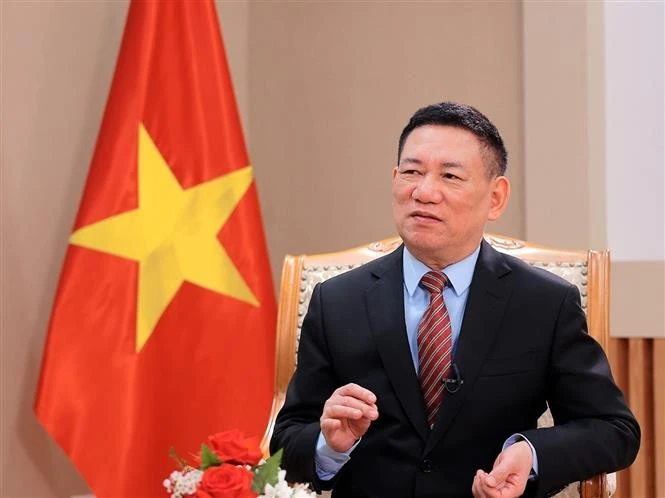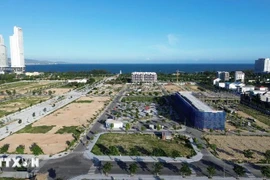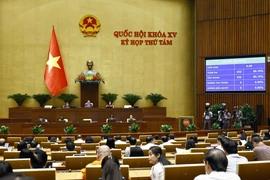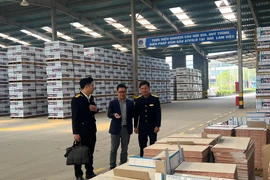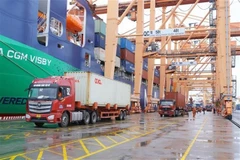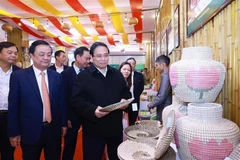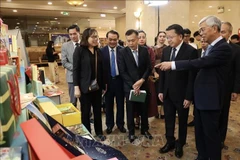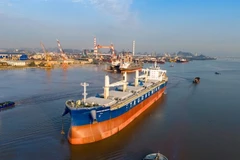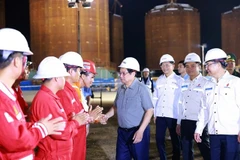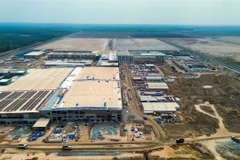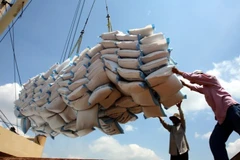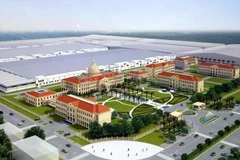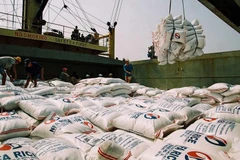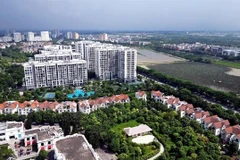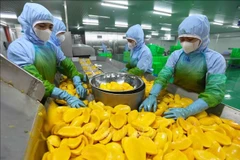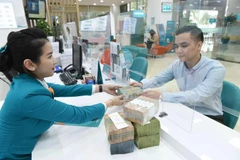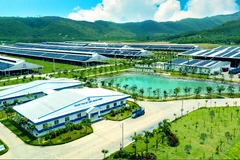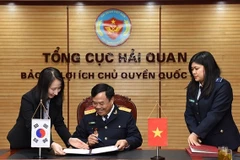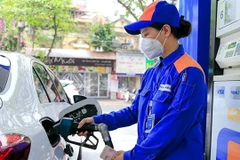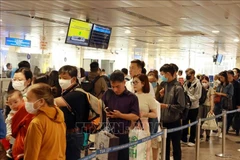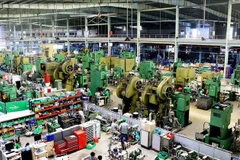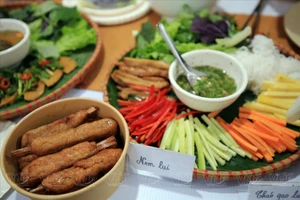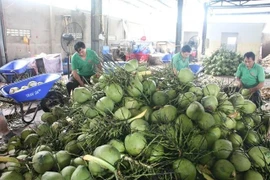Hanoi (VNA) - Deputy Prime Minister Ho Duc Phoc spoke to the Vietnam News Agency (VNA) about the outstanding results in implementing financial and budgetary tasks in 2024 as well as solutions for 2025. The following is the full text of the interview:
Reporter: Could you evaluate the performance of financial and state budget tasks in 2024, given the numerous challenges facing the economy?
Deputy PM Ho Duc Phoc: This year, Vietnam’s economy has faced numerous challenges, both external and internal ones. These included global issues such as tax policies, interest rates, exchange rates, inflation, and military conflicts. Domestically, our economy, with a high degree of openness, is vulnerable to external influences and impacts, such as climate change, the aftermath of floods, low labour productivity, limited technological capacity, and a shortage of high-quality human resources. These challenges were compounded by the need for rapid growth and substantial capital.
These factors have affected the management of fiscal and monetary policies in 2024. However, under the leadership of the Party and the Government, and the management of administrations at all levels, along with the efforts of businesses and people, we achieved outstanding results in socio-economic development, as reflected in economic growth indicators that met or exceeded targets. The country’s gross domestic product (GDP) is projected to reach 7%, surpassing the National Assembly's initial target of 6–6.5%. The consumer price index (CPI) stood at 3.88%, below the 4% target, and public debt at 37% of GDP, significantly lower than the ceiling level of 60% set by the National Assembly. Notably, export-import turnover is expected to reach a record high of 800 billion USD, surpassing the 2022 peak of 732 billion USD.
As of December 24, state budget revenue reached over 1.978 quadrillion VND (77.41 billion USD), surpassing the estimate by 15% and exceeding the same period last year by 17%, which is 298 trillion VND higher than the estimate. We expect revenue of the entire year to exceed the estimate by 17% and surpass the previous year's figure by 19%, or more than 300 trillion VND higher than last year's figure.
Over the past four years, state budget revenue has consistently exceeded the previous year's figure, by over 1 quadrillion VND annually. This remarkable achievement reflects successful fiscal policy management, enabling the country to have more investment in infrastructure such as airports, ports, and expressways along the North-South axis, as well as social welfare policies.
Reporter: Given the increasing difficulties in terms of state budget revenue sources, how will the Government implement measures to reduce expenditures in 2025?
Deputy PM Ho Duc Phoc: In fiscal policy management, the Government always focuses on increasing budget revenue, avoiding revenue loss, expanding revenue base, but at the same time still has to nurture revenue sources through tax, fee, land rent deferral policies, totaling about 200 trillion VND annually to support the business community and drive economic growth. We will ensure efficient budget spending, both for investments and regular expenditures.
The Prime Minister has outlined key directions for 2025, including an immediate 10% reduction in regular expenditures right when the budget allocation is made and an additional 5% reduction to fund a programme to remove dilapidated and temporary houses for the poor nationwide. Along with mobilising social resources, the state budget spent about 7 trillion VND from regular spending savings and from 5% savings on salaries and salary allowances to eliminate dilapidated houses for the poor.
For basic construction investment, we will focus public investment on effective and breakthrough projects that drive economic growth, aiming to build 3,000 km of expressways by 2025 and 5,000 km by 2030, along with embarking on the high-speed rail project.
Hence, saving expenditures to have more investments in projects is a vital task in 2025 so bidding, assigning contractors, construction supervision, and investment management should be closely supervised to save expenses as much as possible.
Reporter: Public investment is considered a key driver for socio-economic development. What measures will the Government take to accelerate the disbursement of this critical fund?
Deputy PM Ho Duc Phoc: Public investment plays a pivotal role in boosting the national economy's development. Over the past years, the Government has carefully selected investment targets and built public investment plans to stimulate economic growth.
However, the process of implementing investment procedures and preparations has faced bottlenecks in terms of devising investment projects, design appraisal, cost estimation, and land clearance, which consume considerable time. These delays have led to slow disbursement, often concentrated in the year-end month.
To address these issues, we have proposed amendments to the Law on Public Investment and four related laws to streamline procedures. For example, land clearance plans will be approved separately, enabling contractors to quickly proceed with construction after bidding, thus shortening project timelines.
Additionally, we have strongly been delegating greater authority and decentralising to ministries, sectors, and localities to reduce administrative procedures and accelerate approval and disbursement progress. By November, the disbursement rate of public investment had reached over 56.4%, and the rate is expected to be higher by the year-end. Therefore, it is a must to speed up the disbursement of public investment right since the beginning of the year to spur the development of economic sectors, and reduce difficulties for the business community and create cash flows for the economy.
Reporter: Could you please outline the key priorities of your leadership and governance to fulfil the budgetary and financial tasks in 2025?
Deputy PM Ho Duc Phoc: In 2025, the State budget revenue is projected at 1.978 quadrillion VND. Of this, domestic revenue accounts for 84.8%, that from import-export makes up 11.9%, and crude oil 2.7%. The budget expenditure is estimated at 2.5 quadrillion VND, with 31% allocated to development investment and 60.9% for regular expenditures. The budget overspending is about 471.5 trillion VND, approximately 3.8% of GDP.
The 2025 budget plan has been set by the National Assembly and assigned to the Government for implementation. To achieve the plan's targets, the Government will need to issue strong directions to exceed the set targets. For example, budget collection will need to increase while efficient spending be ensured to reduce budget overspending and promote investment in key projects of the country. The Government will continue to nurture sources of revenue, further cut value-added tax (VAT) and environmental protection taxes on fuels in the first half of 2025. The management of potential revenue streams such as e-commerce platforms and cross-border online transactions will be strengthened.
The Government remains committed to ensuring that all taxes are collected fairly and in accordance with law. At the same time, spending will be managed in a focus-driven manner, aiming to save costs wherever possible in order to invest in social security and infrastructure development, thereby creating momentum for the country's development.
Reporter: Regarding the merger of the Ministry of Finance and the Ministry of Planning and Investment under the 12th-tenure Party Central Committee's Resolution 18-NQ/TW, could you elaborate on the benefits for financial management and national development?
Deputy PM Ho Duc Phoc: We believe the merger of the Ministry of Finance and the Ministry of Planning and Investment, in line with the 12th-tenure Party Central Committee's Resolution 18-NQ/TW, is a proper, effective and helpful step that aligns with the current development trend. Streamlining the structure will help downsize the personnel on the payroll, lower regular expenditures which currently make up about 68% of total budget spending, and eliminate overlaps in tasks of agencies, ministries, and sectors.
Currently, the merger is being implemented drastically, starting with cutting general departments within both ministries and downgrading them to departments. After the merger, the new ministry will have fewer subordinate units. For example, the General Department of Taxation will be transformed into a department of taxation whose subordinate units will decrease from 63 to 35 at the maximum. Meanwhile, the General Department of Vietnam Customs will be streamlined from 35 offices in provinces and regions to just 15. Simultaneously, these changes will lead to the internal personnel streamlining of around 40%.
The unified ministry will take over the functions and tasks of its two predecessors, including those related to the macro-economy, fiscal policy, public debt, securities, and other areas entrusted by the Party and State. This will help enhance the efficiency of national finance management, supporting the long-term goal of a prosperous nation with well-off and happy people.
We believe that this merger is not only aligned with the trend of the era but also an essential step for Vietnam to advance into a new era - that of the nation's rise to become a powerful nation with prosperity, well-being, and happiness for the people.
Reporter: What message would you like to share as we approach New Year 2025?
Deputy PM Ho Duc Phoc: We perceive that 2025 will present difficulties and challenges, along with reform demands. As such, the entire system, particularly those working in economics and finance, must exert all-out efforts with creativity, determination, and solidarity to excellently fulfil their duties, contributing to national development and prosperity.
Reporter: Thank you very much!
